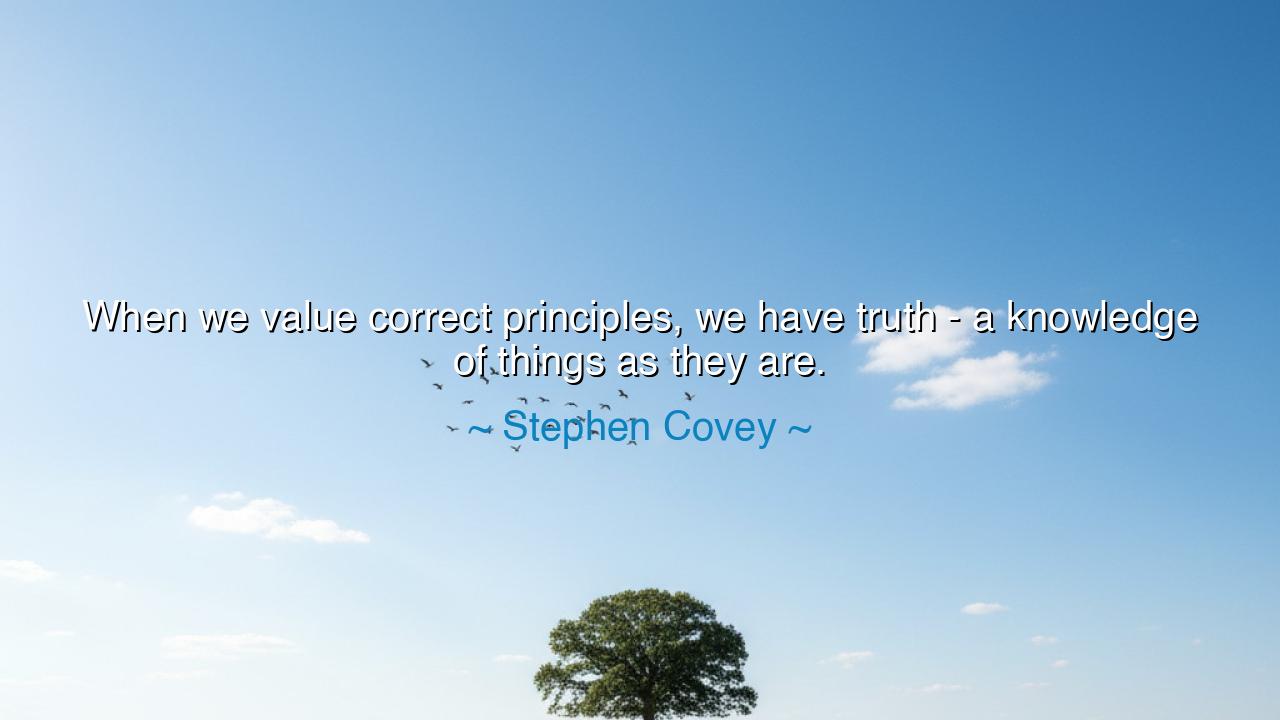
When we value correct principles, we have truth - a knowledge of






The words of Stephen Covey — “When we value correct principles, we have truth – a knowledge of things as they are” — are both a compass and a mirror for the human soul. In this single sentence lies the foundation of integrity, wisdom, and lasting success. Covey, the great teacher of personal and moral leadership, reminds us that truth is not a matter of opinion, nor of convenience, but of alignment with principles that are eternal, unchanging, and self-evident. When we live according to these principles — honesty, compassion, courage, fairness, humility — we come into harmony with reality itself. To know things as they are is to see clearly, to strip away illusion, and to act with understanding instead of impulse.
In the style of the ancients, we might say: principles are to the soul what the stars are to the sailor. They do not bend to our wishes, yet they guide us unfailingly if we learn to read them. Covey’s teaching echoes the wisdom of every great tradition. The Taoist calls it the Way, the philosopher calls it Virtue, the Christian calls it Truth, and the Stoic calls it Reason. Though the words differ, the essence remains: there are laws woven into the fabric of existence — moral and spiritual laws — that govern life as surely as gravity governs matter. To “value correct principles,” then, is to live not by whim or passion, but by the enduring order of truth itself.
The origin of this quote comes from Covey’s seminal work, The 7 Habits of Highly Effective People. In that book, he argues that most people live by personal values, which are often shaped by emotion, culture, or convenience — and while values can change, principles do not. Covey believed that only by centering our lives on principles — not possessions, not popularity, not pleasure — could we achieve lasting peace and effectiveness. To him, “truth” was not an abstract idea but a way of being, where one’s inner compass points toward integrity, discipline, and love. It is in living according to principles that we see life “as it is,” not as our ego or desires wish it to be.
History itself provides luminous examples of those who lived by such truth. Consider Socrates, who chose death rather than abandon his principle of seeking wisdom and integrity. When offered the chance to escape execution, he refused, saying it would violate the very laws and truth he had taught others to respect. His calm acceptance of death was not stubbornness, but clarity — for he had knowledge “of things as they are.” He saw that life without principle is chaos, that truth cannot be traded for safety, and that correct principles are worth more than survival itself. Like Covey, Socrates knew that truth is freedom, not restriction — the alignment of the inner world with the eternal order of the universe.
Covey’s insight also applies to the modern world, where relativism and expediency often cloud judgment. People chase comfort over character, success over service, and pleasure over purpose. But Covey warns that when we violate principles, we may gain temporary satisfaction but lose peace of mind — because truth always reasserts itself. The person who lies for gain must live with the burden of deceit; the one who cuts corners must face the decay of trust. Principles do not punish us; we punish ourselves by ignoring them. To live in truth, therefore, is not merely to know what is right, but to reverence what is right.
The practical wisdom here is profound. To “value correct principles” means to make them the foundation of every choice. In times of confusion, ask not, “What feels good?” but “What is true?” In conflict, seek not victory but understanding. In success, practice gratitude instead of pride. Covey teaches that when we live by principles, reality becomes our ally — doors open, peace abides, and our actions align with purpose. To build one’s life upon principles is like building upon stone: the storms may come, but the structure endures. To build upon emotion, ego, or trend is to build upon sand.
Let this be the lesson to all who hear: the search for truth is not found in argument, but in alignment — in shaping the soul to fit the reality of the world, not bending the world to suit the soul. Covey’s wisdom is both ancient and urgent: that the key to peace, progress, and meaning lies in living by principles greater than ourselves. For when we value correct principles, we do not merely possess truth — we become part of it, and through that union, we see clearly “things as they are,” and not as shadows distorted by our own desires.
So, remember this teaching: truth is not created by us; it is discovered within us. And those who live by it, like the sages of old, walk in harmony with the rhythm of the universe — serene in conscience, steady in purpose, and luminous in spirit.






AAdministratorAdministrator
Welcome, honored guests. Please leave a comment, we will respond soon